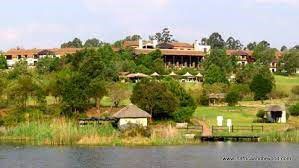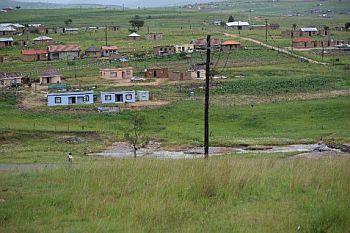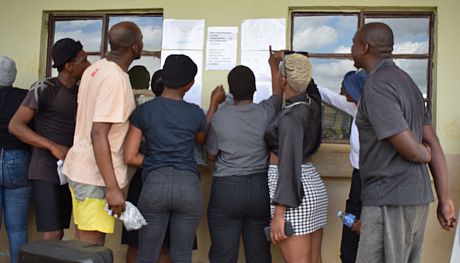Fieldwork: South Africa
By Lisa Wiebesiek & Nkonzo Mkhize
The Research Team
The South African research team, led by Professor Relebohile Moletsane, includes Mr Nkonzo Mkhize and Dr Lisa Wiebesiek (University of KwaZulu-Natal), Thandeka Mazibuko (youth researcher) and Xoli Msimanga (community partner). Because the approach that we are taking is participatory, the young women co-researcher participants (CRPs) with whom we are working are important members of the research team.
Research Sites
 There are two research sites located in the Drakensberg region of KwaZulu-Natal: Emangweni and Emampemvini. The Drakensberg is a world heritage site with a lucrative tourist industry catering for both local and international tourists. Large-scale commercial farming - mostly white-owned - also generates enormous wealth for the area. Alongside and in contrast to this affluence and prosperity, communities of black South Africans living in villages contend daily with food insecurity, a lack of infrastructure and service delivery, poverty, and high rates of unemployment. Luxurious holiday resorts, private estates housing holiday homes (image to the right shows one of many luxury tourist resorts in the Drakensberg) and opulent farmhouses are close neighbours to communities without potable water, waterborne sewage, roads, or electricity (image below shows one of the villages in eMangweni situated near a river where residents do their washing and collect water for cooking, drinking, and ablutions).
There are two research sites located in the Drakensberg region of KwaZulu-Natal: Emangweni and Emampemvini. The Drakensberg is a world heritage site with a lucrative tourist industry catering for both local and international tourists. Large-scale commercial farming - mostly white-owned - also generates enormous wealth for the area. Alongside and in contrast to this affluence and prosperity, communities of black South Africans living in villages contend daily with food insecurity, a lack of infrastructure and service delivery, poverty, and high rates of unemployment. Luxurious holiday resorts, private estates housing holiday homes (image to the right shows one of many luxury tourist resorts in the Drakensberg) and opulent farmhouses are close neighbours to communities without potable water, waterborne sewage, roads, or electricity (image below shows one of the villages in eMangweni situated near a river where residents do their washing and collect water for cooking, drinking, and ablutions).
 Unequal gendered power relations are central to the prevailing conservative values, attitudes and beliefs in Emangweni and Emampemvini. Unequal gender roles, norms, and expectations play a significant role in women and girls’ experiences of education and work in these two communities. As alluded to above, racial inequity and racialised power relations shape the rural contexts in which women and girls experience education and work, and thus these experiences themselves.
Unequal gendered power relations are central to the prevailing conservative values, attitudes and beliefs in Emangweni and Emampemvini. Unequal gender roles, norms, and expectations play a significant role in women and girls’ experiences of education and work in these two communities. As alluded to above, racial inequity and racialised power relations shape the rural contexts in which women and girls experience education and work, and thus these experiences themselves.
Participatory Visual Methodology
The South African project team used participatory visual methodology to work with a group of young women in each research site to deepen our understanding of young women’s work, educational experience and livelihoods in a rural context; and as an approach to developing strategies to improve the livelihoods and well-being of young women in these communities.
 In a series of workshops co-researcher participants have created and engaged in critical discussion about drawings, participatory community maps, photovoice, and cellphilms (short films created using a cellphone or tablet). Based on this work, in upcoming workshops, co-researcher participants will create policy posters and action briefs which will be used as tools for awareness raising and advocacy during community dialogues and other community forums. The data generated during the workshops is analysed collaboratively by the university-based research team and the CRPs.
In a series of workshops co-researcher participants have created and engaged in critical discussion about drawings, participatory community maps, photovoice, and cellphilms (short films created using a cellphone or tablet). Based on this work, in upcoming workshops, co-researcher participants will create policy posters and action briefs which will be used as tools for awareness raising and advocacy during community dialogues and other community forums. The data generated during the workshops is analysed collaboratively by the university-based research team and the CRPs.
A Note on Language
isiZulu is the first language for all of the CRPs in Emampemvini and Loskop. Due to the lack of opportunities to practice English with first-language speakers in these and other rural areas in South Africa, our CRPs were rarely comfortable expressing themselves in this language. The workshops were, therefore, conducted in isiZulu. All audio-recorded data were transcribed and translated into English Nkonzo Mkhize, an experienced translator, who co-facilitated the workshop. All prompts used in the workshops were translated from English to isiZulu and discussed with CRPs to ensure they understood what we were asking of them.
Young Women, Rurality, Education & Work: Emerging findings from South Africa
Our work thus far with our young women CRPs in Emangweni and Emampemvini has generated rich emerging findings which have the potential to influence social and policy change in meaningful ways. We present a selection of these findings below.
Rurality itself poses a challenge for girls and young women accessing and succeeding in education and work. A legacy of colonialism and apartheid, in South Africa, rurality is often synonymous with poverty. People in rural communities often find it challenging to meet basic needs. In such circumstances, immediate needs take precedence over education and longer-term planning in anticipation of potential future prosperity. The literal and figurative distance to accessing services, infrastructure, resources, and opportunities is, for many, impossible to traverse without assistance of some kind. For girls and young women, efforts to travel this distance are further hampered by obstacles related to gender inequity.
Linked to rurality, climate change climate change has made it increasingly difficult for families, who rely on subsistence farming, to be able to live off what they can produce. Because subsistence farming often falls to girls and women who are expected to maintain the house and tend the fields and who are expected to provide food for the family, it is girls and women who experience the worst effects of climate change.
Education is seen by our CRPs as both one of their biggest challenges and the best solution to their problems. Our CRPs identified and described a number of challenges facing girls and young women in rural areas in South Africa and compromise their access to and success in education. A particularly frustrating barrier identified by our CRPs is the lack of support for, even active discouragement of girls’ and young women’s education from families and communities. Education is seen as uneccessary for women who are expected and encouraged to marry early, bear children, and confine their lives to the domestic sphere.This dynamic is complex and will be explored further in future publications.
In spite of the lack of support for girls and young women’s education from families and communities, for our CRPs, education was seen as the ticket out of their challenging circumstances. Having expressed their lack of enthusiasm for getting married and all that married life entails for women, our CRPs saw education as an essential step towards formal employment which would enable them to support themselves, their families and communities. This education-as-saviour narrative is problematic for several reasons which we intend to explore further in future publications.
It is very clear from our CRPs’ visual artefacts and our discussions of them that the burden of work inside and outside the home falls almost entirely on women and girls. The nature of this work is gendered and racialised. There are few opportunities for formal employment in Emangweni and Emampemvini, especially for women. The paid work that is available is intermittent, short-term and unpredictable. It is also badly paid, physically demanding, and, important to our CRPs, and lacks dignity. Girls’ and women’s work in the home was described by CRPs as ceaseless, physically and emotionally demanding, thankless, and oppressive. The image of a heavily pregnant woman cleaning and cooking around her idle husband was a powerful one and one that appeared often in CRPs’ visual artefacts and our discussions.
One of our most valuable emerging findings relates to well-being. Frequently overlooked in favour of more ‘practical’ concerns, our CRPs emphasized the importance of their social, emotional, and psychological well-being as a central element of creating sustainable change. Low self-esteem, a lack of confidence, and a lack of psycho-social support were among the challenges identified by our CRPs.
Gender inequity, an overarching theme, is central to each of the issues described above, intersecting in complex ways with other inequities in a way that creates, recreates, and exacerbates them and serve to constrain girls’ and young women’s agency and their access to resources and opportunities (Wiebesiek, 2022).
Ref: Wiebesiek, L. (2022). Using Participatory Visual Methodology to Explore Girlhood and the Construction of Femininities with Girls and Young Women in Rural KwaZulu-Natal, South Africa [Doctoral Thesis, University of KwaZulu-Natal].